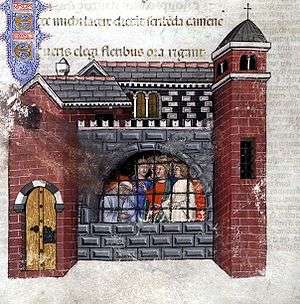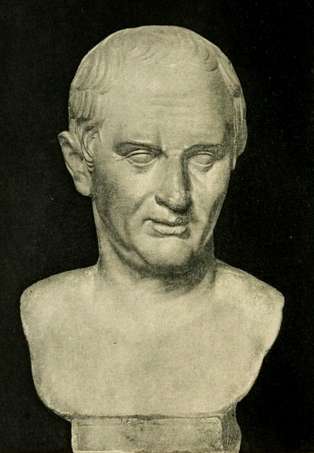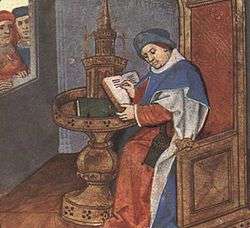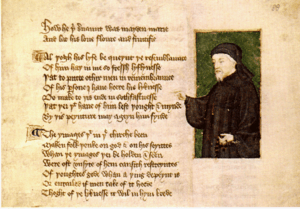Dream vision
A dream vision or visio is a literary device in which a dream or vision is recounted as having revealed knowledge or a truth that is not available to the dreamer or visionary in a normal waking state. While dreams occur frequently throughout the history of literature, visionary literature as a genre began to flourish suddenly, and is especially characteristic in early medieval Europe.[1] In both its ancient and medieval form, the dream vision is often felt to be of divine origin. The genre reemerged in the era of Romanticism, when dreams were regarded as creative gateways to imaginative possibilities beyond rational calculation.[2]

This genre typically follows a structure whereby a narrator recounts his/her experience of falling asleep, dreaming, and waking, with the story often an allegory. The dream, which forms the subject of the poem, is prompted by events in his/her waking life that are referred to early in the poem. The ‘vision’ addresses these waking concerns through the possibilities of the imaginative landscapes offered by the dream-state. In the course of the dream, the narrator, often with the aid of a guide, is offered perspectives that provide potential resolutions to his/her waking concerns. The poem concludes with the narrator waking, determined to record the dream – thus producing the poem. The dream-vision convention was widely used in European literature from late Latin times until the 15th century.
Authors and works
Latin
Ancient Roman
- Augustine of Hippo, Soliloquia
- Boethius, De consolatione philosophiae
- Cicero, Dream of Scipio
- Macrobius, Commentary on Cicero's Dream of Scipio
Medieval Latin
- John Gower, Vox Clamantis Book One is an account of the Peasants' Revolt
- Alain de Lille, De planctu naturae
- Brother Marcus, Visio Tnugdali ("The Vision of Tundale")
French
- Guillaume de Lorris and Jean de Meun, Roman de la rose, also translated into Middle English by Geoffrey Chaucer
- Marie de France, The Legend of the Purgatory of St. Patrick
- Le Chemin de Povreté et de Richesse, a 14th-century dream poem incorporated in Le Ménagier de Paris
- Le Chemin de long estude, by Christine de Pizan
Irish
- The aisling is a genre of dream poetry in Irish literature.
Italian
- Dante Alighieri, The Divine Comedy depicts the conventions of dream-vision literature, though Dante specifically says that his vision is not a dream
Old English
- Bede, Vision of Drycthelm
- Anonymous, The Dream of the Rood – the guide in Dream of the Rood is the Cross on which Christ was crucified.
Middle English
- Geoffrey Chaucer, Legend of Good Women, House of Fame, Book of the Duchess, Parliament of Fowls – The Parliament of Fowls features a dream vision in which the narrator falls asleep while reading the Dream of Scipio and is ushered into a walled garden. He is chaperoned in the dream briefly by Scipio the Elder himself.
- William Langland, Piers Plowman or Visio Willelmi de Petro Ploughman (William's Vision of Piers Plowman) is an apocalyptic Middle English allegorical narrative attributed to William Langland, one of the great works of English literature. It is written in unrhymed alliterative verse divided into sections called passus (Latin for "step").
- Sir John Clanvowe, The Cuckoo and the Nightingale
- Anonymous, Parlement of the Thre [sic] Ages
- Anonymous, Wynnere and Wastoure
- Pearl Poet, Pearl
- The Vision of Tundale, a translation from the Latin Visio Tnugdali.
- John Lydgate, The Temple of Glass
Modern English
- John Bunyan, The Pilgrim's Progress
- Percy Bysshe Shelley, The Triumph of Life
- William Morris, News from Nowhere, A Dream of John Ball
- C.S. Lewis, The Great Divorce tells of a dream vision in which the author joins a group of the damned on a vacation bus trip to heaven, where they encounter various figures from their own pasts who try to entreat them to come and join the company of those in heaven.
- The Eagles, "Hotel California"
- Lewis Carroll's "Alice's Adventures in Wonderland" (1865 ) is in the form of a dream vision.
- James Joyce's (Irish novelist) "Finnegans Wake" (1939) consists of an immense cosmic dream.
Welsh
- Anonymous, The Dream of Rhonabwy, possibly a satire on the medieval dream vision
- Anonymous, The Dream of Macsen Wledig
References
- Ananya Jahanara Kabir, Paradise, Death and Doomsday in Anglo-Saxon Literature (Cambridge University Press, 2001, 2004), p. 78.
- Christine Kenyon, Jones, "Dreams and Dreaming," in Encyclopedia of the Romantic Era, 1760-1850 (Taylor & Francis, 2004), vol. 1, pp. 293–294; Douglas B. Wilson, The Romantic Dream: Wordsworth and the Poetics of the Unconscious (University of Nebraska Press, 1993), p. 11.


